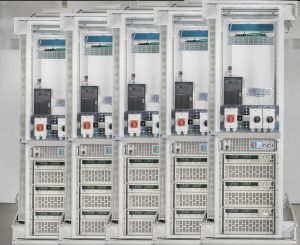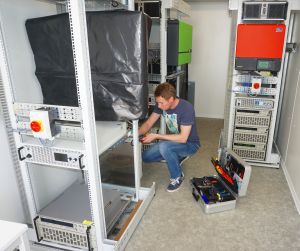Home storage systems for electricity produced by photovoltaics facilities are gaining attractiveness, as their costs are declining. However, standardized, verifiable criteria for the end client to assess their performance are still lacking. Now, scientists have launched the largest German study so far to analyze commercial systems with respect to safety, quality, and grid suitability and to derive recommendations for manufacturers, standardization bodies, and authorities. The “SafetyFirst” project is funded with EUR 4 million by the Federal Ministry for Economic Affairs and Energy and scheduled for a duration of three years.
Storage systems are an important element of the German Energiewende. They store excessive amounts of irregularly produced solar and wind power and feed them back into the grids, if necessary. More and more private households use home storage systems to temporarily store power generated by photovoltaics facilities. Instead of consuming power from the grid, the households can increasingly supply themselves with renewable energy produced on their own.
Thanks to their good price-performance ratio, lithium-ion batteries are increasingly applied in these home storage systems. In operation, however, they differ from conventional lead batteries in some very important respects.

The “SafetyFirst“ project studies safety, quality, and grid suitability of home storage systems for power produced by photovoltaics systems at more than 20 test rigs. (Photo montage: KIT)
“For the end clients and even for an expert electrician, it is difficult or even impossible to reliably assess the safety and quality of these home storage systems, as binding standards and inspection regulations exist for conventional battery technologies only. These test regulations cannot be applied to modern lithium-ion batteries,” Nina Munzke of Karlsruhe Institute of Technology (KIT) explains. She heads the “SafetyFirst” project and has already been involved in a number of projects on the use of lithium-ion batteries as interim storage systems for large solar facilities up to one megawatt power.
Laboratory tests carried out in 2013 revealed major safety deficiencies of home storage systems commercialized in Germany, including fires and explosions of the batteries. This caused the responsible industry associations to cooperate with KIT and to adopt new safety guidelines. They describe the properties and safety features battery systems are to have at least. Now, the large-scale research project funded by the Federal Ministry for Economic Affairs and Energy (BMWi) will analyze whether this latest state of the art of safety research for home storage systems, as outlined in the guidelines, is complied with by the home storage systems sold in Germany.
For this purpose, more than twenty of such systems will be subjected to permanent testing under conditions modeling real situations in private households. These are most of the systems commercially available in Germany. Special load profiles will be selected to investigate safety properties not only of brand-new, but also of aged batteries after several years of operation. These tests will yield data on the safety properties of storage systems as well as on variations of energy efficiency with time and the expected durability of these systems.
In addition to the tests of complete home storage systems, some selected lithium-ion cells will be studied by the Fraunhofer Institute for Solar Energy Systems and the Center for Solar Energy and Hydrogen Research. Parallel to laboratory experiments, recommendations will be drafted for manufacturers of home storage systems, standardization bodies, and the Federal Ministry for Economic Affairs and Energy (BMWi) for the properties of modern lithium-ion batteries being considered in standards, inspection regulations, and terms of funding.
The “SafetyFirst” project funded by the BMWi has a duration of three years and will expire in September 2018. The total project volume is about EUR 4 million. The project is coordinated by Karlsruhe Institute of Technology. The project partners are the Fraunhofer Institute for Solar Energy Systems, Freiburg, and the Center for Solar Energy and Hydrogen Research, Ulm. It is the paramount objective of the project to study the safety, quality, and grid suitability of home storage systems and to derive, on this basis, recommendations for manufacturers of such systems and standardization bodies.
More about the KIT Energy Center: http://www.energy.kit.edu
In close partnership with society, KIT develops solutions for urgent challenges – from climate change, energy transition and sustainable use of natural resources to artificial intelligence, sovereignty and an aging population. As The University in the Helmholtz Association, KIT unites scientific excellence from insight to application-driven research under one roof – and is thus in a unique position to drive this transformation. As a University of Excellence, KIT offers its more than 10,000 employees and 22,800 students outstanding opportunities to shape a sustainable and resilient future. KIT – Science for Impact.

